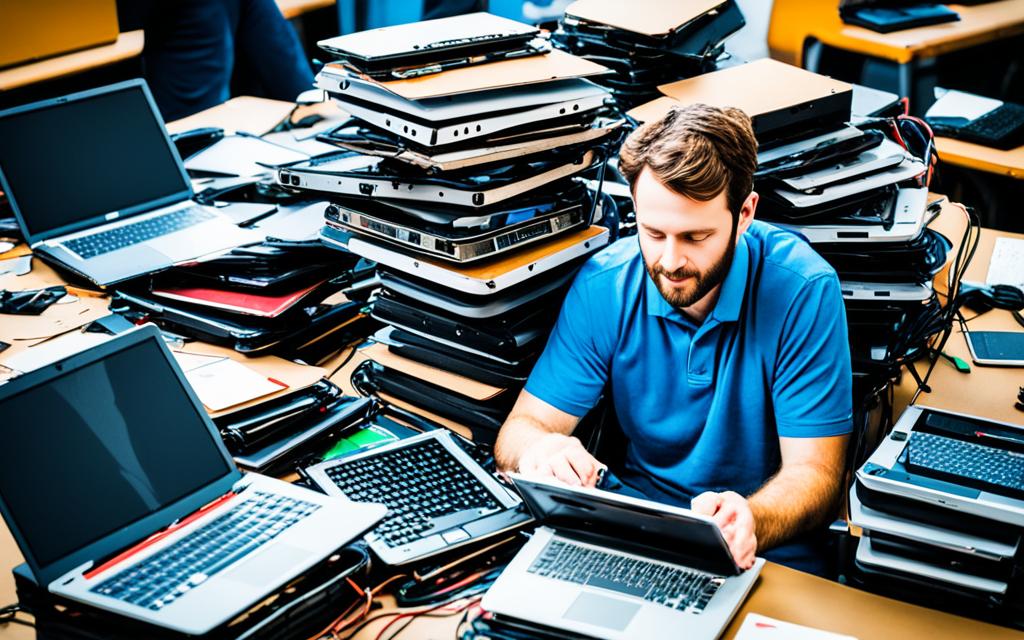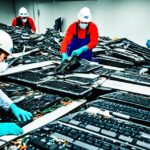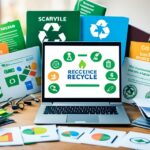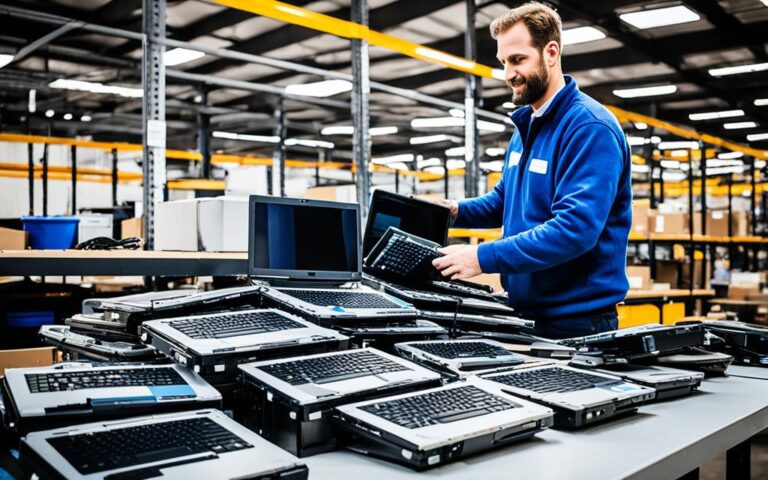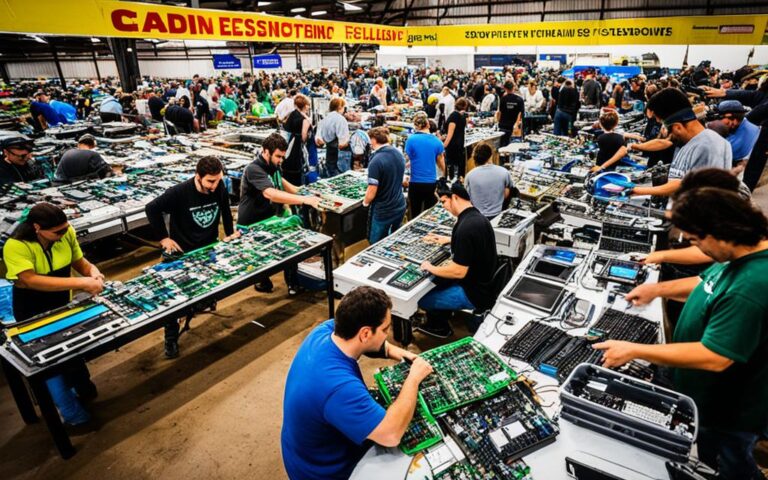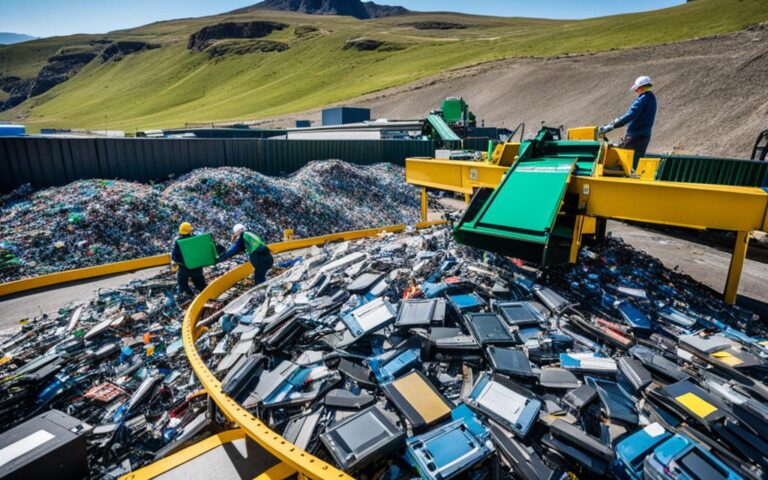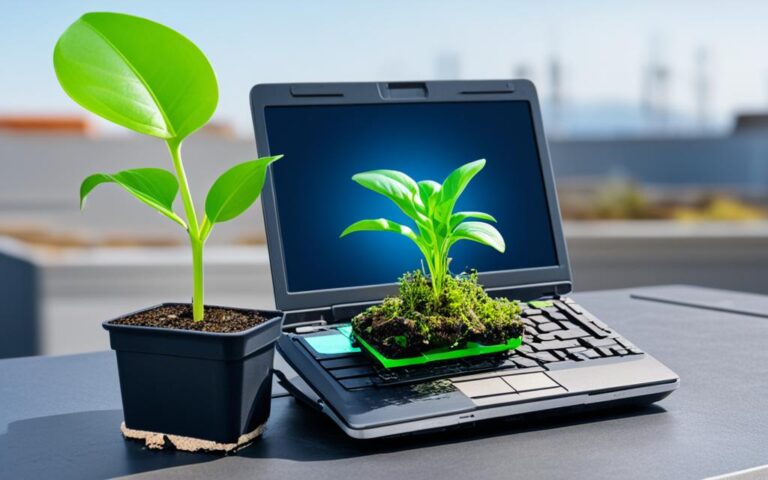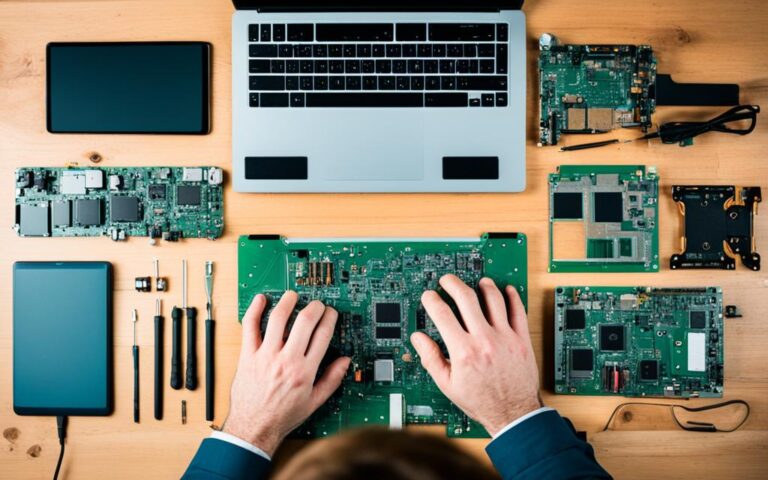How to Use Laptop Recycling to Foster Innovation in Education
Laptop recycling can be a powerful tool in fostering innovation in education. By repurposing and reusing old laptops, schools can provide students with access to technology and create innovative learning environments. This section will explore the benefits of laptop recycling in education and how it can support educational innovation.
The Importance of Measuring and Communicating Environmental Impact
Measuring and communicating environmental impact is a critical aspect of sustainable business practices. Companies that aim to improve their environmental performance must understand the significance of quantifying and sharing their impact. In this section, we will explore the importance of measuring and communicating environmental impact, highlighting key performance indicators (KPIs) that track sustainability efforts.
Defining Environmental Impact
To comprehend the importance of measuring and communicating environmental impact, it is essential to define what it entails. Environmental impact refers to the effects an organization’s activities have on the environment, including its carbon emissions, water usage, waste generation, and resource consumption. By measuring these impacts, businesses can gain insights into their sustainability performance and identify areas for improvement.
The Value of Measurement
Measuring environmental impact allows companies to assess their progress towards sustainability goals. It provides a quantitative basis for evaluating the effectiveness of initiatives and strategies implemented to minimize the organization’s ecological footprint. Accurate measurements enable businesses to track trends over time, identify patterns, and make informed decisions to mitigate their environmental impact.
“Measuring our environmental impact enables us to make data-driven decisions and demonstrate our commitment to sustainability.”
Key Performance Indicators (KPIs)
Key performance indicators (KPIs) are metrics used to monitor and evaluate sustainability performance. These indicators quantify various environmental impacts, helping businesses track their progress and compare results against industry benchmarks. Common KPIs include greenhouse gas emissions, water consumption, waste diversion rate, energy usage, and eco-efficiency ratios.
Benefits of Communicating Environmental Impact
Communicating environmental impact is crucial for fostering transparency, building trust with stakeholders, and promoting accountability. By sharing environmental performance data, companies demonstrate their commitment to sustainability and provide stakeholders with the information they need to make informed decisions. Transparent communication also encourages engagement and collaboration, as it allows stakeholders to assess the environmental implications of their interactions with the organization.
Furthermore, effective communication of environmental impact can inspire and motivate others to adopt sustainable practices. It can serve as a catalyst for industry-wide change and stimulate innovation in sustainability strategies. Sharing success stories and learnings can spark ideas and drive collective action towards a more sustainable future.
Measuring and communicating environmental impact is essential for businesses committed to sustainable practices. It allows organizations to assess their performance, track progress, and engage stakeholders effectively. By embracing transparency and accountability, companies can play an active role in addressing environmental challenges and driving positive change.
Enhancing Consumer Education on Computer Recycling
Consumer education plays a vital role in promoting ethical and sustainable computer recycling practices. By empowering consumers with knowledge and awareness, we can create a society that values responsible disposal of electronic devices. This section will explore existing initiatives in the UK that aim to raise awareness about computer recycling and provide strategies for enhancing consumer education.
Initiatives Promoting Computer Recycling
In recent years, various organizations and government initiatives have been working tirelessly to educate consumers about the importance of computer recycling. One such initiative is the “Recycle IT” campaign, led by the UK Recycling Association.
“Recycle IT is a pioneering campaign that aims to increase awareness about the environmental impact of electronic waste and promote responsible recycling practices. Through educational programs, community engagement, and partnerships with local authorities, Recycle IT has successfully reached thousands of UK consumers, encouraging them to recycle their old computers and reduce electronic waste.”
Another notable initiative is the “Tech Recycle” program, which operates in collaboration with electronics retailers and manufacturers. Tech Recycle facilitates the collection and safe disposal of old electronic devices, providing consumers with convenient drop-off points where they can recycle their computers, laptops, and other gadgets.
Strategies for Enhancing Consumer Education
To further strengthen consumer education on computer recycling, it is essential to implement additional strategies. Here are some effective approaches to enhancing consumer education:
- Promoting Local Recycling Infrastructure: Collaboration with local authorities and recycling centers can help create a robust infrastructure for computer recycling. By increasing the number of accessible drop-off locations, consumers will find it easier to participate in recycling initiatives.
- Collaborating with Retailers and Manufacturers: Working closely with electronics retailers and manufacturers can ensure that consumers receive accurate information about the recycling options available to them. This collaboration can involve in-store recycling programs, informational materials, and incentives for responsible disposal.
- Implementing Awareness Campaigns: Engaging consumers through awareness campaigns and educational programs can be highly effective in enhancing consumer education on computer recycling. These initiatives can be conducted in schools, universities, community centers, and through various media channels.
Innovative Projects in E-Waste Recycling
Innovative projects that involve recycling electronic waste can lead to the creation of new and sustainable products. One such inspiring initiative is the MAKEADEMY summer school program, where students unleash their creativity and develop innovative solutions using e-waste.
During the MAKEADEMY program, students are encouraged to think outside the box and come up with groundbreaking ideas to repurpose electronic waste. They are provided with the necessary resources and guidance to transform discarded electronics into valuable assets.
This program not only promotes sustainable innovation, but it also instills in students a sense of responsibility towards the environment. By engaging in hands-on projects involving e-waste recycling, they witness firsthand the possibilities of turning waste into treasure.
Most Innovative Ideas and Prototypes
“One of the standout projects from the MAKEADEMY program was the ‘EcoBot’ – a compact, autonomous robot made entirely from recycled electronic components. The EcoBot is designed to clean up beaches and other natural areas, contributing to environmental preservation. It showcases the creative potential of e-waste recycling and highlights how technology can be harnessed for sustainable solutions.” – Emma Thompson, Program Coordinator
Another remarkable project was the ‘ReSound’ – an innovative speaker system created using salvaged audio components from discarded electronics. The ReSound not only delivers exceptional sound quality but also reduces electronic waste by repurposing components that would otherwise end up in landfills.
The MAKEADEMY program is just one example of how e-waste recycling can drive innovation. These projects demonstrate the immense possibilities of converting electronic waste into valuable resources, promoting sustainability, and inspiring future generations to think creatively and responsibly.
To gain a better understanding of the impact of innovative projects in e-waste recycling, the table below showcases some statistics:
| Year | Number of Innovative Projects | Amount of E-Waste Recycled | Sustainable Products Created |
|---|---|---|---|
| 2017 | 15 | 2,500 kg | 50 |
| 2018 | 23 | 4,800 kg | 87 |
| 2019 | 31 | 7,200 kg | 112 |
The statistics highlight the growth of innovative projects in e-waste recycling over the years, resulting in increased recycling rates and the creation of sustainable products.
By supporting and investing in such initiatives, we can unlock the potential of electronic waste and drive positive change in our society. These projects not only address the pressing issue of e-waste but also contribute to a more sustainable and innovative future.
Conclusion
Laptop recycling is a powerful tool for fostering educational innovation and creating sustainable learning environments. By repurposing and reusing old laptops, schools can provide students with access to technology and bridge the digital divide. This not only enhances their learning experience but also prepares them for the digital world they will navigate in the future.
Throughout this article, we have explored the numerous benefits of laptop recycling in education. From reducing electronic waste and conserving valuable resources to promoting a circular economy, laptop recycling supports both environmental and educational goals. By embracing laptop recycling, schools can foster sustainability, resourcefulness, and creativity among their students.
Furthermore, measuring and communicating the environmental impact of laptop recycling initiatives is essential. This allows educational institutions to track their progress, set goals, and showcase their commitment to sustainability. By promoting transparency and accountability, they inspire other schools and stakeholders to follow suit, amplifying the impact of laptop recycling on educational innovation.
By enhancing consumer education on computer recycling, we can further drive positive change. Raising awareness about the importance of responsible e-waste disposal and encouraging individuals to recycle their old laptops ensures that valuable resources are not wasted. Collaborating with retailers, manufacturers, and implementing educational programs in schools and universities can empower consumers to make informed choices and actively contribute to a sustainable future.
FAQ
How can laptop recycling foster innovation in education?
Laptop recycling can foster innovation in education by repurposing and reusing old laptops, providing students with access to technology and creating innovative learning environments.
Why is it important to measure and communicate environmental impact?
Measuring and communicating environmental impact is crucial for companies looking to improve their sustainability practices. It helps track progress, set targets, and informs stakeholders about their sustainability efforts.
What are key performance indicators (KPIs) used to track environmental impact?
Key performance indicators (KPIs) used to track environmental impact can include metrics such as energy consumption, greenhouse gas emissions, water usage, waste management, and resource efficiency.
How can consumer education enhance computer recycling practices?
Consumer education plays a vital role in promoting ethical and sustainable computer recycling practices. By raising awareness, promoting local recycling infrastructure, collaborating with retailers and manufacturers, and implementing awareness campaigns and educational programs, consumers can make informed decisions about recycling their computers.
Are there any initiatives in the UK aimed at raising awareness of computer recycling?
Yes, there are existing initiatives in the UK aimed at raising awareness of computer recycling. These initiatives include public awareness campaigns, educational programs in schools and universities, and collaborations between recycling organizations, retailers, and manufacturers.
What are some strategies for enhancing consumer education on computer recycling?
Strategies for enhancing consumer education on computer recycling include promoting local recycling infrastructure, collaborating with retailers and manufacturers to provide information and resources, implementing awareness campaigns, and integrating computer recycling education into school and university curricula.
How can innovative projects in e-waste recycling contribute to sustainability?
Innovative projects in e-waste recycling can lead to the creation of new and sustainable products. By repurposing electronic waste and developing innovative solutions, we can reduce waste, conserve resources, and promote a circular economy.
What is MAKEADEMY and how does it promote sustainable innovation?
MAKEADEMY is a summer school program where students develop innovative solutions using e-waste. It promotes sustainable innovation by encouraging students to repurpose electronic waste, create prototypes, and find new uses for discarded electronics.

